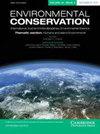Examining how risk diversification for conservation is influenced by the probability assigned to uncertainty scenarios
IF 2.6
3区 环境科学与生态学
Q2 BIODIVERSITY CONSERVATION
引用次数: 0
Abstract
Summary Despite the progress in conservation risk management, conservation organizations are reluctant to interface usable risk-diversification strategies with their decision-making processes. One reason for this reluctance is that the empirical models used to develop risk-diversification strategies need the expected returns on investment (ROIs) of target assets and their variances and covariances, and the probabilities of occurrence of the scenarios needed to calculate those statistics are almost always unknown. We examine how risk diversification for conservation is influenced by the probabilities assigned to uncertainty scenarios using a case study involving the conservation of biodiversity at the county level in the central and southern Appalachian region within the framework of modern portfolio theory. A comparison of risk-mitigating portfolios with bootstrapped and fixed probability distributions shows that introducing the flexibility of an unknown probability distribution of uncertainty scenarios allows conservation organizations to spread bets more than with the inflexibility of the fixed probability distribution, while also achieving higher expected ROIs per unit of risk on average. The improvement becomes more significant when conservation organizations are less risk averse.研究不确定情景的概率如何影响保护的风险分散
尽管在保护风险管理方面取得了进展,但保护组织不愿意将可用的风险分散策略与他们的决策过程结合起来。这种不情愿的一个原因是,用于开发风险分散策略的经验模型需要目标资产的预期投资回报率(roi)及其方差和协方差,而计算这些统计数据所需的场景发生的概率几乎总是未知的。本文在现代投资组合理论的框架下,以阿巴拉契亚中部和南部地区县级生物多样性保护为例,研究了不确定性情景的概率对保护风险分散的影响。对自举和固定概率分布的风险缓解投资组合的比较表明,引入不确定性情景的未知概率分布的灵活性使保护组织比固定概率分布的不灵活性更能分散赌注,同时平均每单位风险也能获得更高的预期roi。当保护组织不那么厌恶风险时,这种改善就会变得更加显著。
本文章由计算机程序翻译,如有差异,请以英文原文为准。
求助全文
约1分钟内获得全文
求助全文
来源期刊

Environmental Conservation
环境科学-环境科学
CiteScore
5.20
自引率
3.70%
发文量
43
审稿时长
>36 weeks
期刊介绍:
Environmental Conservation is one of the longest-standing, most highly-cited of the interdisciplinary environmental science journals. It includes research papers, reports, comments, subject reviews, and book reviews addressing environmental policy, practice, and natural and social science of environmental concern at the global level, informed by rigorous local level case studies. The journal"s scope is very broad, including issues in human institutions, ecosystem change, resource utilisation, terrestrial biomes, aquatic systems, and coastal and land use management. Environmental Conservation is essential reading for all environmentalists, managers, consultants, agency workers and scientists wishing to keep abreast of current developments in environmental science.
 求助内容:
求助内容: 应助结果提醒方式:
应助结果提醒方式:


